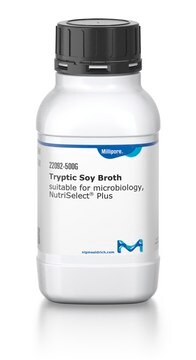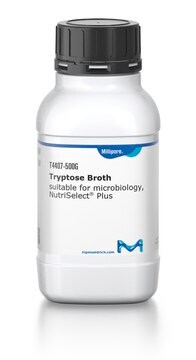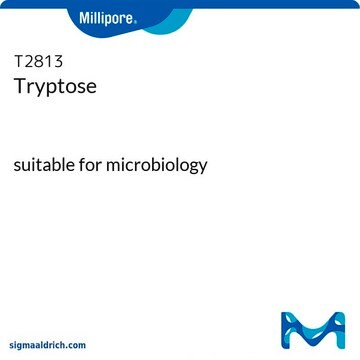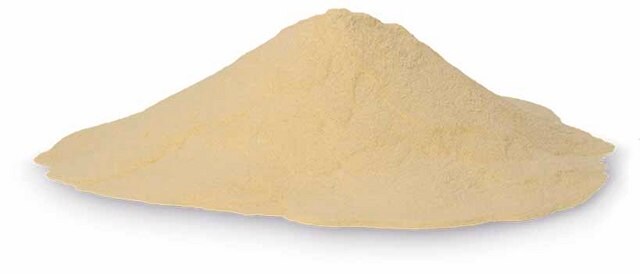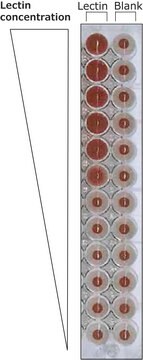추천 제품
생물학적 소스
Porcine pancreas
형태
liquid
기술
cell culture | insect: suitable
배송 상태
ambient
저장 온도
2-8°C
애플리케이션
In addition to its use for the growth of fastidious micro-organisms, Tryptose Phospate Broth (TPB) has been studied as supplement for the preparation of media that supports vaccine production in BHK-21 cells and the growth of SF21 insect cells in high-density perfusion culture stirred-tank bioreactors.
성분
Tryptose Phosphate Broth (TPB) is composed of four components: Tryptose (20g/L); Dextrose (2g/L); NaCl (5g/L) and Disodium Phosphate (2.5g/L) typically adjusted to pH 7.3. The tryptose component is a peptone (mixture of amino acids and short peptides) derived by the mixed enzymatic hydrolysis (pancreatic enzymes) of the milk protein casein. This hydrolysate provides a source of amino acid based nutrients and survival factors that support the growth of fastidious micro-organisms such as Brucella, Streptococcus, and Neisseria; as well as eukaryotic cells such as insect and animal cells. Dextrose provides a fermentable carbohydrate that can be used by fastidious mico-organisms. Sodium chloride maintains the osmotic and ionic equilibrium and disodium phosphate provides the basic buffering capacity.
기타 정보
This Tryptose broth is closely related to Tryptose phosphate broth, but does not contain the phosphate component and it contains a lower concentration of dextrose.
제조 메모
This formulation contains Tryptose (20 g/L); Dextrose (1 g/L); and NaCl (5g/L) adjusted to a final pH of 7.2.
또한 이 제품과 함께 일반적으로 구입
제품 번호
설명
가격
Storage Class Code
12 - Non Combustible Liquids
WGK
nwg
Flash Point (°F)
Not applicable
Flash Point (°C)
Not applicable
시험 성적서(COA)
제품의 로트/배치 번호를 입력하여 시험 성적서(COA)을 검색하십시오. 로트 및 배치 번호는 제품 라벨에 있는 ‘로트’ 또는 ‘배치’라는 용어 뒤에서 찾을 수 있습니다.
S N Saha et al.
Vaccine, 7(4), 357-363 (1989-08-01)
Studies were undertaken to develop a cheaper medium with indigenous sources of peptone and casein hydrolysate for continuous culture of BHK-21 (suspension) cells and production of foot-and-mouth disease (FMD) vaccine. Eleven batches of experimental media were prepared using different indigenous
A I Josemans et al.
Annals of the New York Academy of Sciences, 969, 141-146 (2002-10-17)
The in vitro culture of Cowdria ruminantium, the causative agent of heartwater in domestic ruminants, was first achieved in 1985. Culture media were usually supplemented with serum and tryptose phosphate broth, both undefined components, contributing to great variability. Recently, we
S M Deutschmann et al.
Enzyme and microbial technology, 16(6), 506-512 (1994-06-01)
Spodoptera frugiperda insect cells (IPLB-Sf21-AE) (Sf21), infected with baculovirus expression vectors during their exponential growth phase, are commonly used to produce a variety of heterologous recombinant proteins. In the present study the culture conditions of these insect cells were studied
자사의 과학자팀은 생명 과학, 재료 과학, 화학 합성, 크로마토그래피, 분석 및 기타 많은 영역을 포함한 모든 과학 분야에 경험이 있습니다..
고객지원팀으로 연락바랍니다.